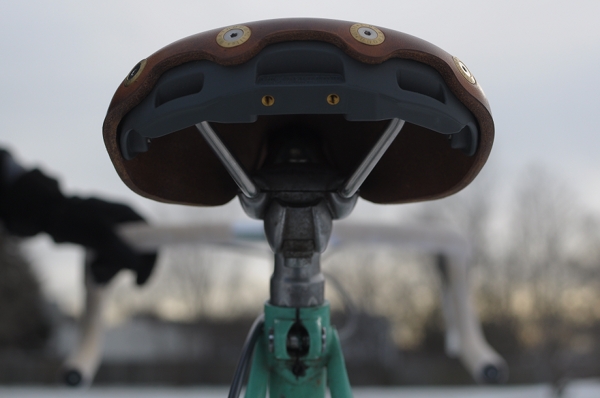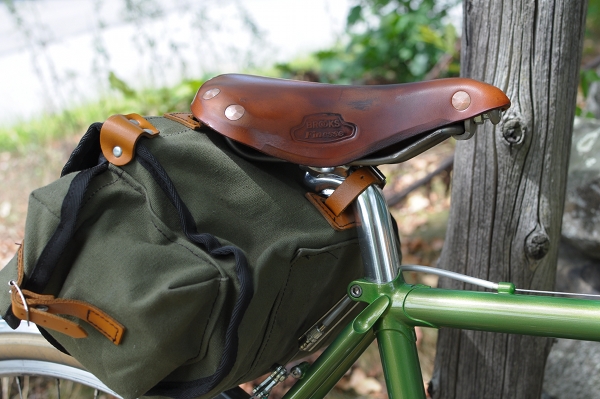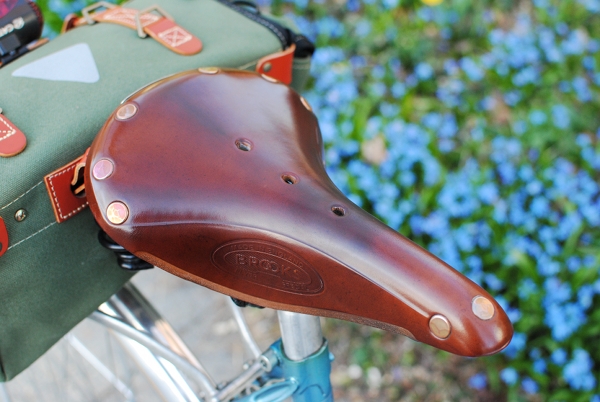Male readers: you may want to skip this one. Of course if you feel up to it, you are welcome to keep reading. But don't say I didn't warn you.
Female readers: I've had email exchanges with so many of you about "women's issues" with bicycle saddles, and it's amazing how much embarrassment there is among us (and I include myself) when it comes to discussing our bodies - especially given how common these problems are. While with men, we can read and hear all about perineal this and genital that, with women it's all hush-hush and seldom addressed in a manner explicit enough to be helpful. So I'll try to get over my own embarrassment, and write about it in detail here.
There are many different kinds of female-specific saddle problems and I will organise them into several categories: posterior discomfort, genital discomfort, infections, and menstruation.
Posterior Discomfort
For the sake of keeping things women-specific, let's assume that the problem is not an overpadded saddle (which can cause bunching up in a way that is painful to both genders), and begin with the premise that you have a leather or plastic saddle with minimal padding. With most new saddles there is a break-in period, and it is normal if your butt feels sore on the first ride, or even several rides. But if it still hurts just the same after a reasonable break-in period, and the pain feels to be the result of pressure on the sit bones, then the saddle may be wrong for your derriere. For women, the problem tends to be choosing a too-narrow saddle. Women typically have wider sit bones than men and also tend to be less aggressive cyclists, which puts more pressure on their behinds. If your butt hurts where the sitbones are, a wider saddle will usually solve the problem. Padding, on the other hand, is not usually effective. Light chamois padding as part of your cycling shorts can make an already comfortable ride more comfortable over long distances. But the more typical heavier padding usually makes things worse, not better.
Genital Discomfort
When riding an upright bicycle, a female cyclist should feel no genital discomfort, because that part of her body is not in contact with the saddle in a way that causes pressure. On the other hand, a roadbike - with its forward-leaning posture, will tilt the genital region directly onto the saddle. Female cyclists typically experience genital discomfort in one of two places: the labia (vaginal "lips") and the clitoral area.
Labia: When cycling on a roadbike, some women report that their vaginal lips bunch up and press painfully into the saddle - so much so, that after a long ride there can be abrasions and bleeding. While some recommend getting saddles with a cut-out in the center, this is not always effective: Every woman's anatomy is different and the cut-out may not be in the right place. Though it's pretty much impossible to keep loose folds of skin from shifting about while you're pedaling, you can avoid abrasions with generous applications of chamois cream or vaseline before you set off on your ride. Creams such as DZNuts that use tea tree oil as a main ingredient seem to be particularly effective. Vaseline works as well, but be aware that it can discolour leather saddles if it seeps through shorts. Others prefer to use baby powder or corn starch, but the few times I've tried this it was a mess. Another method to prevent severe chafing may be to wax or epilate (but not shave) the entire area. For some, coarse pubic hair contributes to abrasions and getting rid of it improves things.
Clitoral Region: An even more difficult issue to deal with is clitoral pain. This is a problem that you either have or you don't, depending on your anatomy. For some women the location is safely out of harm's way, while for others it presses directly into the hard nose of the saddle. In the event of the latter, chamois cream is not sufficient to alleviate the discomfort that ensues. Some recommend tilting the nose down, but this is not always possible, as doing so can cause the cyclist to slide forward, putting more pressure on her hands and making the whole riding position uncomfortable. The only solution here is to find a saddle that works through personal trial and error, which can be frustrating and expensive. I've suffered through this particular problem on and off with my Brooks B17S saddle since last Spring. Then I tried the Gilles Berthoud "Marie Blanque" and the problem disappeared entirely. Some also say that the Brooks "S" road saddles actually make this problem worse, not better, since the hard nose of these saddles does not just end sooner, but starts sooner. There are other suggestions out there for specific saddles that could solve this problem, including Terry saddles and "noseless" saddles. But the suggestions are all based on personal experiences of individual women and it is simply impossible to find a single solution for everyone, given the inconsistent location of this particular body part.
Recurring Infections
Female cyclists can be prone to yeast infections and urinary tract infections (UTIs). The causal factors underlying both types of infections are numerous, and contrary to what some believe, they are not necessarily due to poor hygiene. Of course, showering both immediately before and after a strenuous ride will lower the risk of infections, but most women who get them are already doing this. Often, synthetic shorts or underwear could be to blame: bacteria thrives underneath synthetic fabrics, even when the garments are advertised otherwise. If you get recurring yeast infections or UTIs when you cycle, consider wearing exclusively silk or wool underwear and wool cycling shorts. And definitely consider a suspended leather saddle - which unlike other saddles, is breathable. Natural fabrics, good ventilation and moisture wicking are key here. It also helps to use simple soaps (made of actual soap, not perfumed body washes or moisturising soaps) and to avoid artificially perfumed sprays or lotions in or around your vaginal area. Be especially cautious on hot and humid days, as well as on days during which there are drastic weather changes - infections are more likely to occur at these times.
Menstruation
As any exercise, cycling can relieve menstrual cramps and counter PMS symptoms - so if you're up to cycling for sport during your period there is no reason not to do it. But straddling a bicycle saddle for hours while menstruating can present its own set of challenges. Blood flow increases during exercise, so if you are planning on a long ride, it's a good idea to change your tampon or sanitary napkin more frequently than usual. If you don't use tampons, then there is also the issue of blood being an irritant, with the potential to cause abrasions and infection. One way to avoid this is to shower right before your ride, then take wet naps with you and stop every hour in a restroom facility to clean up and change your sanitary napkin. If that sounds like too much trouble, consider using tampons or avoiding cycling for sport during menstruation - especially if you are prone to the abrasions and infections discussed earlier.
I hope this post was helpful. If you would like to discuss these issues, and, especially to share your own experiences and remedies, remember that I allow anonymous comments and you don't need to log in under your regular screen name.
Monday, April 4, 2011
Subscribe to:
Post Comments (Atom)
Blog Archive
-
▼
2011
(631)
-
▼
April
(69)
- Surly Progress and a Couple of Glitches
- Working on Mistress, My Yamaha V-Star 1100 Classic
- 1929 Model Big Four Norton - SOLD
- Weekly Twitter Redux
- PCG Digital Marketing Announces First Ever Passion...
- 1928 Model 24 - For sale
- On Weddings and Bicycles
- Tameron Hyundai Announces Hyundai Taps Power Of Gr...
- Europe doubles the share of renewable energy in a ...
- Long Island Custom Motorcycle paint, custom automo...
- Market Report, "Romania Autos Report Q2 2011", pub...
- Domestic Bike Share
- Norton at the 1914 Isle of Man TT
- When Cyclists Complain About Cyclists
- Find Your Favorite NC Kia Dealer on Facebook
- Roadie Lads and Lasses: Suggestions for Sunglasses?
- Car Recalls for Nissan and Toyota Continue: Steeri...
- 1923 Model 18 cylinder head - For sale
- On Living Locally and Seeking Continuity
- 1928 Model 18 Norton
- Soma's Fab in 650B! A Test Ride of the Buena Vista...
- Selling your Car SwapRide announces partnership wi...
- Popular Demand: Weekly Twitter Redux
- Action Toyota: New Prius Is Coming Soon
- Every Month Is 'Bike Month'
- Don Marshall Auto Announces Return of Minivan Sale
- Peltier Chevrolet Has Over 300 Used Cars for Longv...
- Loaded
- Threadless Stems: the Good, the Bad and the Ugly
- c1924 Model 18 Norton
- Sprint’s New Mobility Solution for a Better Planet...
- The Surly Cross Check: a Worthy Host for 700C Fat ...
- Intrigued by the Pedersen
- Tony's 1930 Model CS1 Norton
- Fast Cages / NASCAR
- Stainless Steel Rainbow Bike
- LED task light enhances visual performance and red...
- UK carbon floor price could weaken British competi...
- That Fateful Click
- Stanley on the 1926 senior TT winning Norton
- Tentec Launches New Bolt Tensioning Tools for Larg...
- Staining Your Grips to Match Your Saddle
- Tameron Hyundai announces Hyundai to Introduce New...
- An important letter from Mrs Woods to Stanley Woods
- Bike Fit: A Case of Evolving Preferences?
- Across America On The Power Of One Lightbulb
- The Unicrown Fork
- Ford’s 3 Latest Industry-Exclusive Technologies ta...
- Orlando FL Dodge shoppers flood Central Florida Ch...
- Model 16H Norton
- Philosophy Panniers: Two Versatile Classics
- New Market Research Report: Australia Autos Report...
- Doubling Down?
- “Civil Warriors” Documentary Will Air on National ...
- Reusable Grocery Bags: Their Contents and Discontents
- Aspect Enterprise Solutions Is Positioned In Gartn...
- Wimmer and KeyMotorsports Ready For O’Reilly Auto ...
- Joe Craig tells of incident between the big races...
- Bicycle Blogs and Social Media
- 1937 Model 40 Manx - For sale
- The Young International Releases New EP
- High-Vis Rainbike, Anyone?
- How Saudi Downstream 2011 Exceeded Expectations!
- Female Anatomy and Saddle Discomfort
- Two Years Older, Not Much Wiser!
- 1937 Model ES2 Norton - For sale
- When Simplicity Trumps Comfort
- Uphill Momentum?
- Satisfied Customers Write Positive Bill Pierre Che...
-
▼
April
(69)





0 comments:
Post a Comment